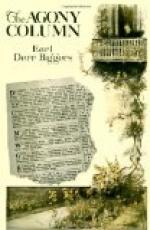“You will pardon this intrusion,” she said in the correct careful English of one who has learned the speech from a book. “I have come for a brief word with you—then I shall go.”
I could think of nothing to say. I stood gaping like a schoolboy.
“My word,” the woman went on, “is in the nature of advice. We do not always like those who give us advice. None the less, I trust that you will listen.”
I found my tongue then.
“I am listening,” I said stupidly. “But first—a light—” And I moved toward the matches on the mantelpiece.
Quickly the woman rose and faced me. I saw then that she wore a veil—not a heavy veil, but a fluffy, attractive thing that was yet sufficient to screen her features from me.
“I beg of you,” she cried, “no light!” And as I paused, undecided, she added, in a tone which suggested lips that pout: “It is such a little thing to ask—surely you will not refuse.”
I suppose I should have insisted. But her voice was charming, her manner perfect, and that odor of lilacs reminiscent of a garden I knew long ago, at home.
“Very well,” said I.
“Oh—I am grateful to you,” she answered. Her tone changed. “I understand that, shortly after seven o’clock last Thursday evening, you heard in the room above you the sounds of a struggle. Such has been your testimony to the police?”
“It has,” said I.
“Are you quite certain as to the hour?” I felt that she was smiling at me. “Might it not have been later—or earlier?”
“I am sure it was just after seven,” I replied. “I’ll tell you why: I had just returned from dinner and while I was unlocking the door Big Ben on the House of Parliament struck—”
She raised her hand.
“No matter,” she said, and there was a touch of iron in her voice. “You are no longer sure of that. Thinking it over, you have come to the conclusion that it may have been barely six-thirty when you heard the noise of a struggle.”
“Indeed?” said I. I tried to sound sarcastic, but I was really too astonished by her tone.
“Yes—indeed!” she replied. “That is what you will tell Inspector Bray when next you see him. ‘It may have been six-thirty,’ you will tell him. ‘I have thought it over and I am not certain.’”
“Even for a very charming lady,” I said “I can not misrepresent the facts in a matter so important. It was after seven—”
“I am not asking you to do a favor for a lady,” she replied. “I am asking you to do a favor for yourself. If you refuse the consequences may be most unpleasant.”
“I’m rather at a loss—” I began.
She was silent for a moment. Then she turned and I felt her looking at me through the veil.
“Who was Archibald Enwright?” she demanded. My heart sank. I recognized the weapon in her hands. “The police,” she went on, “do not yet know that the letter of introduction you brought to the captain was signed by a man who addressed Fraser-Freer as Dear Cousin, but who is completely unknown to the family. Once that information reaches Scotland Yard, your chance of escaping arrest is slim.




